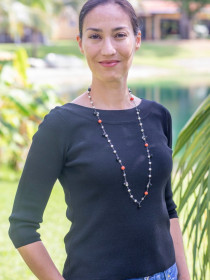
Asia Anna Eaton
Connect with Asia
About Asia
Eaton is a feminist social psychologist who studies the social and psychological causes and consequences of sexism. Specifically, she explores how gender intersects with identities such as race, sexual orientation, age, and class to affect individuals' access to and experience with social power in (1) intimate partner relationships and (2) in the workplace. In Eaton's work on intimate partner relationships, she addresses questions such as "how does gender influence power dynamics in heterosexual relationships, such as who has control in early romantic and sexual interactions?" and "how do gender roles relate to dating violence?". In Eaton's research on the workplace, she seeks to answer questions like "how do stereotypes about gender and sexuality affect people's access to power in organizations?" and "how do people decide to disclose stigmatized identities in the workplace, and what are the consequences of disclosure for women and men?"
Contributions
In the News
Publications
Examined rates of nonconsensual pornography victimization and perpetration in the United States, as well as health correlates of victimization.
Examined how intersecting stereotypes about gender and race influence faculty perceptions of post-doctoral candidates in STEM fields in the United States. Highlights how understanding the underrepresentation of women and racial minorities in STEM requires examining both racial and gender biases as well as how they intersect.
Investigated the degree to which gender differences in changes in turnover intentions and intentions to return to the workforce are explained by changes in perceived career encouragement from organizational members (a pushed-out factor), as well as changes in the employees’ own career motivation (an opting-out factor), throughout pregnancy.
Examined perceptions of gay men’s fitness for leadership positions in the workplace.
Studied the effect of organizational policies on bystanders' willingness to report instances of co-worker perpetrated male-to-female sexual harassment. Found that a zero-tolerance policy (vs. no salient policy or a standard policy) leads to the highest likelihood of participants saying they would report the instance of harassment as bystanders, especially for instances of moderate sexual harassment.
Examined the scripts associated with heterosexual Hispanic and White young adults’ most recent initial sexual or romantic encounter using two samples of heterosexual undergraduates.